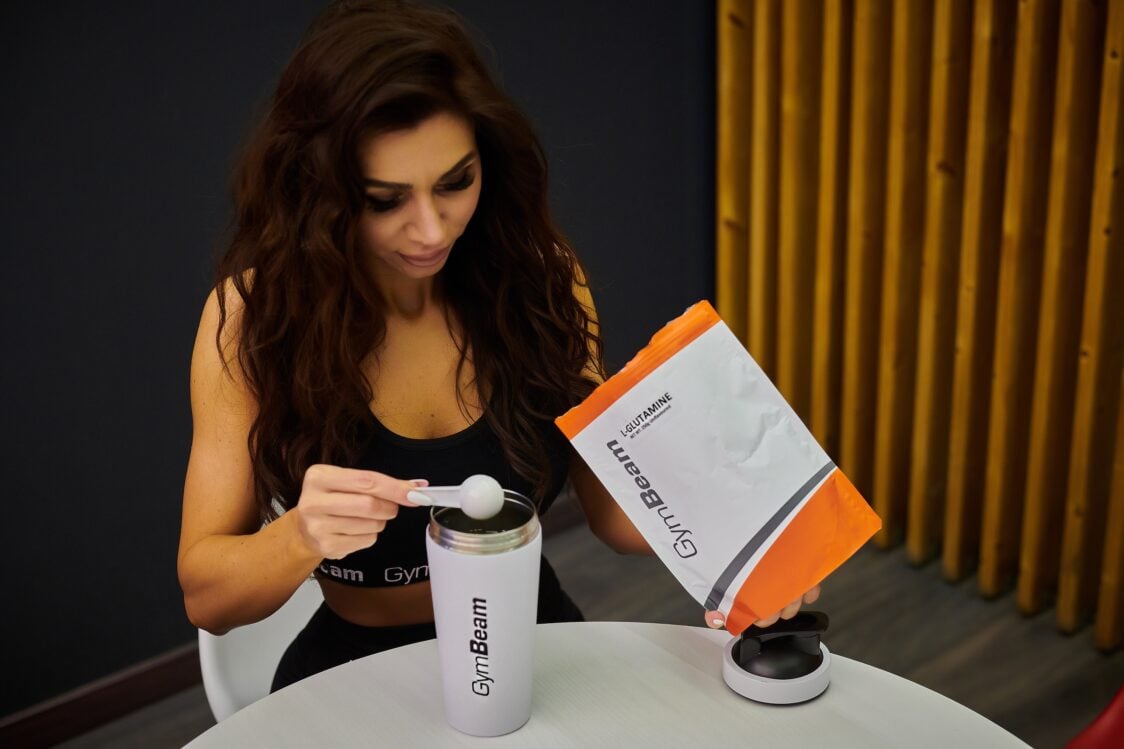Table of Contents
Glutamine is one of the most popular dietary supplements among strength and endurance athletes. This amino acid is typically taken to promote sports performance, muscle growth, recovery and surprisingly, digestion. In today’s article, we’ll take a look at the most well-known effects of this substance together, and then you can form an opinion on whether glutamine is the right supplement for you.
In this article you will read about the effect of glutamine on these specific areas:
What is glutamine?
Glutamine is one of 20 amino acids found in your body. It is actually the most abundant amino acid in the body. In the case of a 70 kg person, it makes approximately 70-80 g and of this amount, and on average 80% is found in muscle tissue. In skeletal muscle, it thus has the highest proportion of all amino acids.
This amino acid is a semi-essential amino acid, which means that your body can produce it on its own, but in certain situations this natural synthesis may not be enough. Therefore, it is sometimes necessary to obtain glutamine from external sources (food, supplements). [1-2]
There are two forms of glutamine, namely L and D. Only the L-form, which is commonly found in foods and dietary supplements, is of use to humans.

What is the difference between glutamine and glutamate?
You may be wondering if there is any difference at all between glutamine and glutamate, or glutamic acid. Both of these substances are amino acids, but they have different functions in the body.
- Glutamate is a non-essential amino acid, which your body can produce on its own, among other things, from glutamine. It serves as an excitatory neurotransmitter that is involved in brain functions such as thinking or memory. In the food industry, this substance is used as a flavouring.
- Glutamine, in contrast, has more complex functions in the body. It plays a role in metabolism, immunity and other physiological processes. [7]
What is the function of glutamine in the body?
1. It is a basic component of muscle mass and other tissues
Glutamine, like other amino acids, is an essential building block of body tissues. It constitutes 50-60% of all amino acids in the muscles. Thus, it contributes to a great extent to their growth and regeneration. [2]

2. Source of nitrogen
Glutamine also stands out above most other amino acids with its double nitrogen content. It is the basis of all peptide bonds of all proteins in your body and is also a structural component of RNA and DNA, or your genetic information. Therefore, glutamine supplementation can be beneficial in postoperative states, periods of illness and other situations where your body needs to regenerate and build body tissue more intensively. [6]
3. Promotes wound healing
Glutamine participates in the wound healing process by supporting immune system function and also participates in the formation of collagen, the main structural protein of the skin. [5]
4. Source of energy
Some cells of the intestinal mucosa and immune system use glutamine as an energy source. Therefore, it is one of the key substances involved in optimal digestion and immune function. [2]
5. Involved in carbohydrate metabolism
Glutamine is an amino acid involved in gluconeogenesis, a process that produces glucose (a simple sugar) from non-carbohydrate sources such as lactate or glycerol. Through a series of metabolic reactions, this produces glucose, which is a rapidly usable source of energy for your body. [15]
6. Glutathione and neurotransmitter formation
Glutamine also forms the human body’s most important antioxidant, glutathione, which helps protect cells from oxidative stress. It is also a precursor to the main excitatory neurotransmitter glutamate, which is involved in the brain in areas such as the ability to think, learn and concentrate. But the body can also use it to synthesise the neurotransmitter GABA (gamma-aminobutyric acid), which in turn has inhibitory or calming effects. [3]
7. Maintains acid-base balance and participates in detoxification
Maintaining the acid-base balance or pH within an optimal range is essential for the health of the body. Glutamine also plays a role in this by being formed from glutamate and ammonia, a substance that is alkaline in nature. If there is an excess of ammonia in the body, the body may begin to produce more glutamine, thus reducing the alkalinity. This will get rid of the unwanted free ammonia, and at the same time promote the body’s natural detoxification. If, on the other hand, the pH is too acidic, glutamine will break down and ammonia will raise the pH alkalinity to normal values. [4]
You might be interested in these products:
8 of the most well-known effects of glutamine
1. Growth of muscle mass
It probably won’t surprise you that glutamine supplementation is mainly used by athletes who want to gain maximum muscle mass. The goal is to provide the body with the optimal amount of building material for building muscle mass. This is subjected to continuous breakdown (catabolism) and creation (anabolism) in your body. If you want to grow, you need to ensure that anabolic processes outweigh catabolic ones. This is best achieved through quality strength training combined with sufficient intake of amino acids (protein) from the diet or supplements.
However, glutamine alone is not enough for muscle growth. You need all 9 essential amino acids to provide enough building material for muscle hypertrophy, just like building a house. You wouldn’t just use mortar and bricks for that. These amino acids are found in complex protein sources such as meat, fish, eggs or whey protein. However, glutamine also contributes to the whole process of building muscle mass. First and foremost, it can activate the signalling protein mTOR, which triggers the process of muscle protein synthesis (MPS – Muscle Protein Synthesis). But that’s not all. Glutamine also has anti-catabolic effects, which are most pronounced during physical stress (after a hard workout, during illness). [16-17]
Finally, you should not forget that in order to support muscle growth it is also important to meet your total daily protein intake, which for strength athletes should generally be in the range of 1.4-2 g/kg body weight. [18]
If you are in the process of gaining muscle mass and are wondering how best to support it through diet and training, read these practical tips from our article 10 Nutrition and Training Tips for Maximum Muscle Growth.

2. Post-workout recovery
Who wouldn’t want to recover after a workout more rapidly, more efficiently and without greater muscle soreness? After a hard workout at the gym, it’s common for your muscles to be sore for a few days. This is due to the recovery processes associated with repairing damaged muscle fibres. Glutamine can help speed up this process, allowing you to return to a proper workout faster.
This has been shown, for example, in a study with professional basketball players. As part of the protocol for this study, for 20 days, one group of participants took 6 g of glutamine per day and the other took a placebo. After that, the two groups swapped supplementation protocols for another 20 days. Before the study began and after it ended, blood samples were taken from the players, from which the researchers evaluated changes in indicators of muscle damage. As a result, they found that the group taking glutamine had lower levels of creatine kinase, aspartate transaminase and the hormone cortisol. Compared to the placebo group, this suggests that taking glutamine may have alleviated muscle damage caused by training. [19]
Similar results were reported in a study that looked at Delayed Onset Muscle Soreness (DOMS) after training. In it, participants took glutamine at 0.3 g/kg body weight plus maltodextrin or just pure maltodextrin every day for 72 hours after strength training. The glutamine group then experienced less muscle soreness at both 24 and 72 hours after training. Interestingly, however, this effect was not as pronounced in the female study group. [20]
These results suggest that glutamine has the potential to promote recovery, which is essential not only for repairing strained muscles, but also for their growth and preparation for further training.
For more ways to make recovery more effective, read our article How to Boost Recovery with a Massage Gun and Other Aids?

3. Sports performance
Glutamine is involved in a number of metabolic processes related to energy production in your body. For example, it can be converted into glucose, which is the first choice energy source for your muscles It can also activate the production of the stored carbohydrate glycogen, which is then used by the muscles especially during endurance activities. Last but not least, it can help balance pH, thus alleviating muscle acidification. [21-22]
However, during prolonged or high-intensity exercise, the level of this amino acid in the body can drop, which could compromise performance and recovery. This is especially true for endurance runners, cyclists and other athletes who have workouts lasting several hours. When supplementing with glutamine during training, studies suggest that it can lead to sustained athletic performance and delay fatigue. [23]
If you’re wondering which other supplements can boost endurance performance, check out our article 11 Of The Best Supplements For Running, Cycling, And Other Endurance Sports.

4. Immune system
As we have already discussed, glutamine serves as an energy source for some of the cells of the immune system. These include lymphocytes (white blood cells), macrophages and neutrophils, without which your natural defences would not function properly. The function of glutamine is particularly important in people who are seriously ill and in intensive care units (ICUs), where there is often high catabolism (loss of muscle mass), which also disrupts the normal metabolism of amino acids, including glutamine. For this reason, this substance is a common component of clinical nutrition given to seriously ill patients to support their immunity. [2, 24]
However, we already know that even strenuous training can lead to glutamine deficiency, which is associated with a compromised immunity and a higher risk of respiratory disease. This is especially true for endurance athletes. For example, studies have found that marathon runners had 30-40% less glutamine in their muscles than normal 6-9 hours after exercise. Taking l-glutamine during training as part of their fluid intake can help them maintain optimal levels and normal immune function. [2, 23]
If you’re wondering what else you can do to boost your immunity, check out 15 Ways to Boost Your Immune System and Protect Your Health.

5. Digestive system
This amino acid also plays an important role in the digestive system. It is also used by some cells of the intestinal mucosa as a source of energy for their growth and repair, thus supporting the maintenance of the integrity of this barrier. This helps prevent the passage of harmful substances (microbes) from the digestive tract into the bloodstream. [25]
In contrast, a breach in the integrity of the intestinal mucosa or increased permeability of the gut (leaky gut) is a risk for inflammatory bowel disease or poor absorption of nutrients from the diet. This problem is also often associated with certain diseases of the digestive tract, such as Crohn’s disease or Coeliac disease. [26]
Glutamine also has a positive effect on maintaining a healthy gut microbiome. You can think of it as a small but diverse zoo. It is a community of microorganisms that have chosen your large intestine as their home. Therefore, you live with them under ideal conditions in a kind of harmony. Along with digestion, it is now known that the microbiome also has an impact on the immune system and, to some extent, on mental health and brain function. [27]
For example, sufficient fibre intake is essential for smooth digestion. You can learn more about its benefits and which foods contain it in our article Fibre: Why Do We Need It and What Foods Is It In?
6. Sweet cravings
Cravings for sugary foods often arise when your blood sugar (glycaemia) drops. A sweet bar or other treat may satisfy the cravings for a while, and the sugar level rises quickly, but within a short while it can drop again. This sets off a vicious circle. A full meal containing complex carbohydrates, protein, fat and fibre can help you out, but glutamine can also help.
You may wonder, how this works? We’ll get right to it, because supplementing with this substance can contribute to a more stable glycaemia, which according to studies is also associated with better appetite control. As a result, the use of glutamine is also being explored as a supportive treatment option for diabetes and obesity. Better control of sweet cravings may also facilitate weight loss and maintenance of a healthy body weight. [28]
If you’re struggling with an uncontrollable sweet tooth and are wondering what might help, you can find out the essentials in our articled 15 Steps to Get Rid of Sweet Cravings.
Discover our bestsellers:
7. Brain function
Glutamine also works in your brain and throughout your nervous system. It is primarily a precursor to glutamate, which acts as the main excitatory neurotransmitter. It is thus involved in the regulation of thinking, learning, memory, mood and appetite. However, the body can also use it to produce the neurotransmitter GABA, which in turn is associated with feelings of calm, relaxation and sleep. It is so important for our psyche and daily activities to have these substances in balance, and a sufficient amount of glutamine contributes to this. [29-30]
Substances that can support brain function are called nootropics. If you want to learn more about them, have a look at our article Nootropics: Substances to Improve Concentration and Memory. Which are the Best?

8. Other possible effects of glutamine
- Health uses: the effects of glutamine are currently being investigated in various other areas. Due to its effect on immunity, it is already being used in healthcare, to promote wound healing, in critically ill patients and in post-operative care. [24]
- Impact on mental health: there is ongoing research into the effects of glutamine on mental health, particularly its role in anxiety and depression. [30]
- Antioxidant effects: glutamine forms the antioxidant glutathione in the body, which helps protect cells from oxidative stress. This occurs to a greater extent during strenuous training. Therefore, the effect of glutamine supplementation on the antioxidant activity of athletes’ bodies is currently being researched. [32]
- Growth hormone: the effect of glutamine on the production of growth hormone, which affects muscle growth and a variety of other bodily processes, is also the subject of ongoing research. [33]
Is it worth taking glutamine for weight loss?
If you’re trying to lose weight and want to make sure you have all the essential amino acids you need to protect your muscles, glutamine can help. A nice bonus can be its effect on curbing sweet cravings, which many people struggle with, not just during weight loss.
Which foods contain glutamine?
Glutamine is not uncommon in our diet. It can be found in common foods such as meat, fish, eggs or milk. However, it can also be found in single-ingredient or complex amino acid supplements. [10]
Food item 100 g | Amount of glutamine (g) |
|---|---|
| Beef | 1.231 |
| Tofu (soy) | 0.603 |
| Eggs | 0.559 |
| Corn | 0.406 |
| Rice | 0.301 |
| Milk | 0.275 |
Causes of glutamine deficiency in the body
In normal conditions, the body’s own production of glutamine is enough to cover the need for this substance. However, everything changes when your body finds itself in stressful conditions in which the need for glutamine increases rapidly.
- The most common causes of glutamine deficiency are injuries, post-operative and septic conditions, burns, infections, malnutrition and strenuous sports activities. [8]
- It is also common for people who experience severe physical trauma to have increased gut wall permeability (leaky gut), which can also lead to glutamine loss. [8]
- Glutamine is mainly formed in the muscles. Even muscle loss that occurs during periods of prolonged illness or in the elderly can lead to insufficient synthesis of this amino acid. [9]
- Glutamine deficiency has also been observed in studies in people who have undergone a strenuous training program. Thus, low glutamine availability is often considered a symptom of overtraining. [9]

Recommended glutamine dosage
- Supplementation with l-glutamine is usually recommended at a dose of 5 g per day or more. [11]
- You can divide the total daily amount into 2-3 servings.
- In healthy people, adverse symptoms have not been observed even when glutamine is ingested in amounts of 20-30 g (up to 0.65 g/kg body weight) divided into smaller doses administered only a few hours apart. [12]
- Extremely high doses are not recommended because of the risk of excessive serum ammonia. The lowest dose that resulted in higher ammonia levels was 0.75 g/kg body weight, or approximately 51 g for a 68 kg individual. [11]
- You can take L-glutamine in the form of tablets, which you just need to drink with water, or soluble powder. Glutamine peptides are also effective, which are even more rapidly absorbed and digested compared to l-glutamine.

When to take glutamine and what to combine it with?
- It is not necessary to take glutamine at a specific time of day, but regularity is important.
- If you exercise, it is ideal to supplement this substance after a workout, during which glutamine levels in the muscles may have dropped. For example, in combination with whey protein, you will have an effective drink for recovery.
- However, you can also add it to the BCAAs you drink during your workout. This creates a more complex amino acid drink.
- Glutamine is also often combined with creatine, which is commonly taken before or after a workout. Creatine helps to restore cellular energy used by the muscles for their activity, and supplementing with glutamine will support the maintenance of optimal levels in the body. [13]
Side effects of glutamine
Glutamine is generally considered a safe substance. As long as you are healthy, you don’t need to worry about side effects if you follow the recommended dosage of glutamine. It is a natural substance that you ingest normally through your diet. [13]
If you are allergic to glutamine or overdose, symptoms such as headache, bloating, nausea and other digestive problems may occur. You can avoid digestive problems by not taking glutamine on an empty stomach. Stir the unflavoured powder into porridge, yoghurt or a smoothie. [14]
For whom is glutamine not suitable?
- If you have kidney or liver disease, consult your doctor about the suitability of taking glutamine.
- It is not recommended for use in those with an increased sensitivity to monosodium glutamate (MSG). [14]
What should you remember?
Glutamine is a supplement with a wide range of effects that will be appreciated not only by athletes. It is involved in building muscle mass, regeneration, immune function and maintaining the integrity of intestinal mucosa. However, it also has potential in regulating sweet cravings or supporting brain function. Although your body can produce it on its own, in some situations, such as after a hard workout, this synthesis may not be enough. In this case, supplements with l-glutamine can come in handy to help maintain an optimal amount of this substance in your body.
Did you learn anything new and interesting from this article? Please don’t forget to share it with your friends.
[1] ScienceDirect Topics. Glutamine—An overview – https://www.sciencedirect.com/topics/neuroscience/glutamine
[2] Cruzat, V., Rogero, M. M., Keane, K. N., Curi, R., & Newsholme, P. Glutamine: Metabolism and Immune Function, Supplementation and Clinical Translation. – https://doi.org/10.3390/nu10111564
[3] Fröberg, M., & Wernerman, J. Glutamine Metabolism. In J.-L. Vincent & J. B. Hall (Ed.), Encyclopedia of Intensive Care Medicine (s. 993–997). – https://doi.org/10.1007/978-3-642-00418-6_667
[4] ScienceDirect Topics. Glutamine—An overview . – https://www.sciencedirect.com/topics/medicine-and-dentistry/glutamine
[5] News, G. S. Targeted-Nutrition-Therapy-Key-Ingredients-to-Support-Wound-Healing. – https://www.generalsurgerynews.com/Wound-Care/Article/09-21/Targeted-Nutrition-Therapy-Key-Ingredients-to-Support-Wound-Healing/64663?ses=ogst
[6] ScienceDirect Topics. Glutamine—An overview.– https://www.sciencedirect.com/topics/biochemistry-genetics-and-molecularbiology/glutamine
[7] GeeksforGeeks. Difference Between Glutamate and Glutamine. – https://www.geeksforgeeks.org/difference-between-glutamate-and-glutamine/
[8] Restorative Medicine. Glutamine.– https://restorativemedicine.org/library/monographs/glutamine/
[9] Agostini, F., & Biolo, G. Effect of physical activity on glutamine metabolism. – https://doi.org/10.1097/MCO.0b013e328332f946
[10] Lenders, C., Liu, S., Wilmore, D., Sampson, L., Dougherty, L., Spiegelman, D., & Willett, W. Evaluation of a novel food composition database that includes glutamine and other amino acids derived from gene sequencing data. – https://doi.org/10.1038/ejcn.2009.110
[11] Woznik, PGlutamine Research Analysis. – https://examine.com/supplements/glutamine/
[12] Training—ScienceDirect. Dosing and Efficacy of Glutamine Supplementation in Human Exercise and Sport. – https://www.sciencedirect.com/science/article/pii/S0022316622096973
[13] MUSCLE INSIDER. Taking Glutamine And Creatine.– https://muscleinsider.com/content/taking-glutamine-and-creatine
[14] You Likely Won’t Get Much Benefit From Taking L-Glutamine If You’re Healthy. – https://www.womenshealthmag.com/health/a41345109/l-glutamine-benefits/
[15] Stumvoll, M., Perriello, G., Meyer, C., & Gerich, J. Role of glutamine in human carbohydrate metabolism in kidney and other tissues. – https://doi.org/10.1046/j.1523-1755.1999.055003778.x
[16] Stumvoll, M., Perriello, G., Meyer, C., & Gerich, J. Role of glutamine in human carbohydrate metabolism in kidney and other tissues. – https://doi.org/10.1046/j.1523-1755.1999.055003778.x
[17] Examine. Fact check: Does glutamine build muscle? – https://examine.com/supplements/whey-protein/faq/jlBPwQ5-fact-check-does-glutamine-build-muscle/
[18] Kerksick, C. M., Wilborn, C. D., Roberts, M. D., Smith-Ryan, A., Kleiner, S. M., Jäger, R., Collins, R., Cooke, M., Davis, J. N., Galvan, E., Greenwood, M., Lowery, L. M., Wildman, R., Antonio, J., & Kreider, R. B. ISSN exercise & sports nutrition review update: Research & recommendations. – https://doi.org/10.1186/s12970-018-0242-y
[19] Córdova-Martínez, A., Caballero-García, A., Bello, H. J., Pérez-Valdecantos, D., & Roche, E. Effect of Glutamine Supplementation on Muscular Damage Biomarkers in Professional Basketball Players. – https://doi.org/10.3390/nu13062073
[20] Legault, Z., Bagnall, N., & Kimmerly, D. S. The Influence of Oral L-Glutamine Supplementation on Muscle Strength Recovery and Soreness Following Unilateral Knee Extension Eccentric Exercise. – https://doi.org/10.1123/ijsnem.2014-0209
[21] Coqueiro, A. Y., Rogero, M. M., & Tirapegui, J. Glutamine as an Anti-Fatigue Amino Acid in Sports Nutrition. – https://doi.org/10.3390/nu11040863
[22] Phillips, G. C. Glutamine: The nonessential amino acid for performance enhancement. – https://doi.org/10.1007/s11932-007-0043-6
[23] Examine. Research Breakdown on Glutamine. – https://examine.com/supplements/glutamine/research/#oJAy4Je-exercise-and-skeletal-muscle_oJAy4Je-endurance-performance
[24] ScienceDirect. Clinical Use of Glutamine Supplementation. – https://www.sciencedirect.com/science/article/pii/S0022316622096961
[25] N, A., P, D., & M, C. Glutamine and the regulation of intestinal permeability: From bench to bedside. – https://doi.org/10.1097/MCO.0000000000000339
[26] Allan, S. What is Leaky Gut Syndrome? – https://cdhf.ca/en/what-is-leaky-gut-syndrome/
[27] Deters, B. J., & Saleem, M. The role of glutamine in supporting gut health and neuropsychiatric factors. – https://doi.org/10.1016/j.fshw.2021.02.003
[28] Jafari-Vayghan, H., Varshosaz, P., Hajizadeh-Sharafabad, F., Razmi, H. R., Amirpour, M., Tavakoli-Rouzbehani, O. M., Alizadeh, M., & Maleki, V. A comprehensive insight into the effect of glutamine supplementation on metabolic variables in diabetes mellitus: A systematic review. – https://doi.org/10.1186/s12986-020-00503-6
[29] Albrecht, J., Sidoryk-Węgrzynowicz, M., Zielińska, M., & Aschner, M. Roles of glutamine in neurotransmission. – https://doi.org/10.1017/S1740925X11000093
[30] Nootropics Expert. L-Glutamine. – https://nootropicsexpert.com/l-glutamine/
[31] He, R., Zheng, R., Zheng, J., Li, M., Wang, T., Zhao, Z., Wang, S., Lin, H., Lu, J., Chen, Y., Xu, Y., Wang, W., Xu, M., Bi, Y., & Ning, G. Causal Association Between Obesity, Circulating Glutamine Levels, and Depression: A Mendelian Randomization Study. – https://doi.org/10.1210/clinem/dgac707
[32] Pires, R. S., Braga, P. G. S., Santos, J. M. B., Amaral, J. B., Amirato, G. R., Trettel, C. S., Dos Santos, C. A. F., Vaisberg, M., Nali, L. H. S., Vieira, R. P., Maranhão, R. C., Pithon-Curi, T. C., Barros, M. P., & Bachi, A. L. L. L-Glutamine supplementation enhances glutathione peroxidase and paraoxonase-1 activities in HDL of exercising older individuals. – https://doi.org/10.1016/j.exger.2021.111584
[33] Effects of an oral mixture containing glycine, glutamine and niacin on memory, GH and IGF-I secretion in middle-aged and elderly subjects. – https://pubmed.ncbi.nlm.nih.gov/14609312/


Add a comment